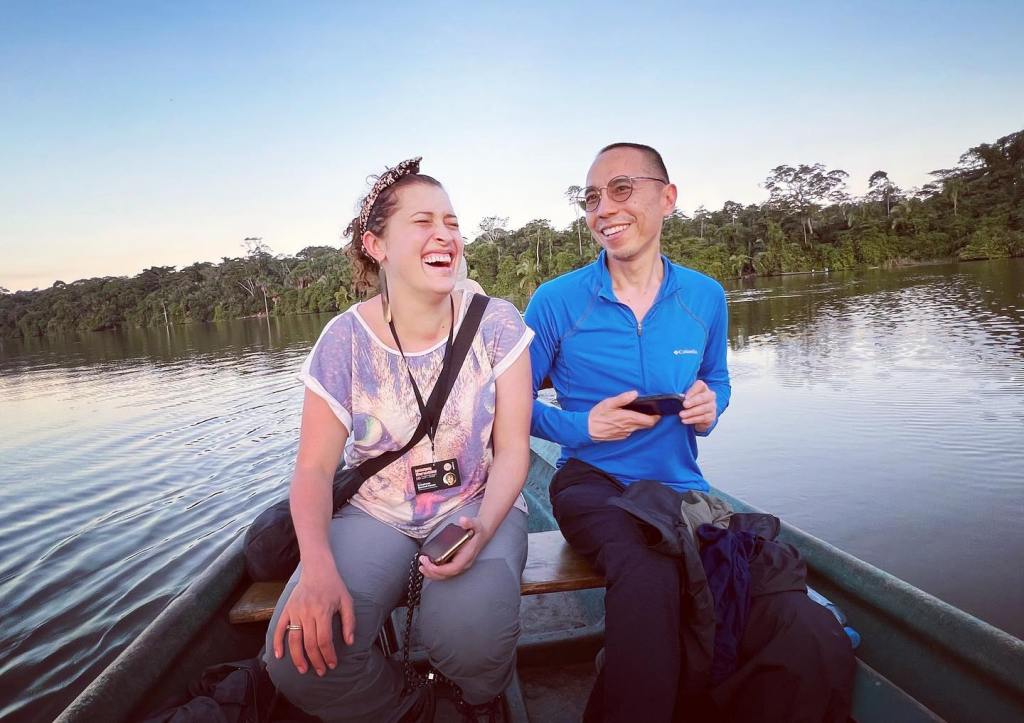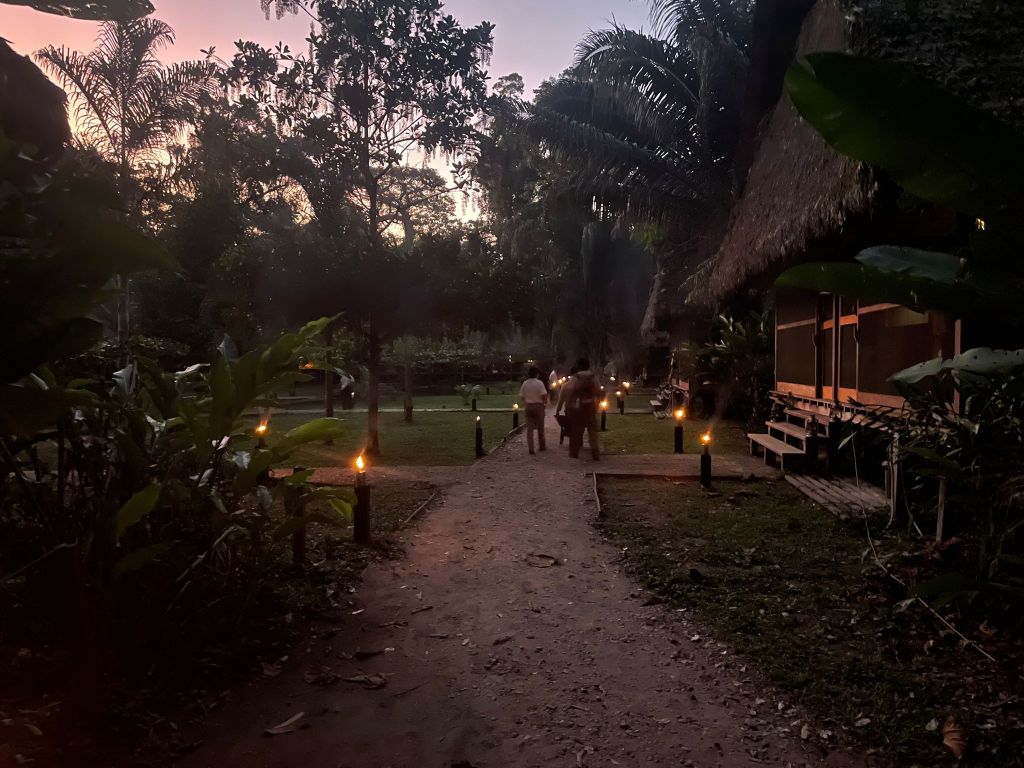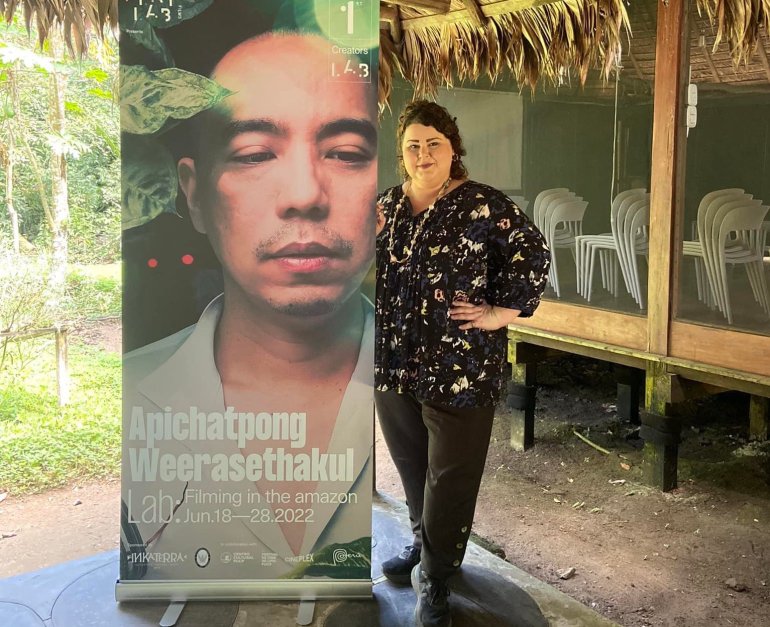It’s not every day that you get to sail down the Amazon River in a canoe to do location scouting with a Palme d’Or winning director who is guiding you on your short film.
But that was the recent experience of Kate Vinen, one of 50 directors – and three Australians – selected for Playlab Films’ 10-day development lab in Peru with Apichatpong Weerasethakul, the Thai auteur behind films such as Uncle Boonmee Who Can Recall His Past Lives and Memoria.
The lab followed a methodology first created by Abbas Kiarostami and then adapted by Werner Herzog, which aims to get filmmakers out of their comfort zone and tasked with creating a film from scratch in a short time period in an unfamiliar place.
When Vinen saw the program promoted online, she applied immediately, despite not having yet left the country since the pandemic or knowing how she would get the time off.
“I was on my computer and I saw ‘Apichatpong and the Amazon’. I literally almost fell off my chair, because he’s one of my favourite filmmakers and I’d say that the Amazon is probably my number one bucket list place to go,” she tells IF.
Days began at 6am with meditation guided by Weerasethakul, then filmmakers were into the rainforest to start crafting their short films, often walking back through jungle at night, spotting tarantulas by torchlight.
Weerasethakul would mentor each person from development to post-production, often reminding the participants that it wasn’t about making a masterpiece, but exploring and having fun.
“Each evening after dinner we would have an open conversation with Apichatpong, who insisted he wasn’t a ‘mentor’, but there to learn from us at the same time. The theme of the lab was a ‘conversation’,” Vinen says.
The filmmakers stayed in Inkaterra Field Guide Station in the rainforest, built so scientists, researchers and creatives can have supported time within the Amazon. Other Australian filmmakers attending the lab included Charlotte Mungomery and David Hansen.

For Vinen, to be with the jungle with living and working alongside 49 other directors from around the world was “like a utopia”, with endless conversation about filmmaking. Each person’s rough cut was screened on the final night in a screening space known as ‘The Canopy’, surrounded by jungle and powered by a generator.
“I remember someone said to me at some point, ‘This isn’t a filmmaking workshop, it’s a spiritual retreat’,” Vinen says.
“We all got along really well, I’m guessing because we’re all drawn to [Weerasethakul’s] work.
“It was incredible to just be connected to people from different cultures that are all making film in very different ways and have similar sensibility.
“On the last day, we watched all the films. It was so overwhelming. We watched 50 films, varying lengths – it was a long day – and each film spoke to a number of the others. It really was a collaborative space… It was very connected. Api said at one point said ‘We’ve become one brain’. It felt that way.”

Vinen’s film was Mitayero, which means ‘hunter’. It follows a man has a bad dream and makes a decision to never hunt for wild food again, and to start a farm.
She had a guide/translator to assist with working with a local non-actor, but otherwise worked alone. It was her first time having to do all cinematography and editing herself – a steep but empowering learning curve. It was a relief when Weerasethakul said he liked the film.
“He’s an incredibly intuitive, abstract creative thinker that avoids convention at every thought, which is one of the skills I wanted to learn from him,” she says.
Crafting the film at such a fast pace was not without its challenges however, including respectfully working with non-actors and with people of a different culture in limited time frame, and directing performance in Spanish.
Vinen describes the environment as overwhelming – “very alive”; it was hot, there were animals, insects, no phone reception or WiFi, and the distractions of 49 other filmmakers, all while trying to find a story and locations she connected with.
That said, it was freeing to not have to think about anything but creating her film, with everything else – meals and the like – taken care of.
“It feels like as a maker, you’re often fighting or pushing against the real world to try and create. But there’s something so amazing about the feeling of a space, and people supporting you, that feels really empowering.”
In terms of what she learned from Weerasethakul, Vinen says his biggest reminder was that a filmmaker should not try to be anybody but themselves.
“He was encouraging us to not mimic his work. So I got out of it to go inwards in terms of my own creative practice. He’s very passionate about not explaining to your audience; that you can understand the references and they don’t need to, which I’m quite interested in exploring going forward.
“I’d gotten a little bit sucked into the Australian way of making works, about getting funding. Api does moving image works, he does installations and then he does these bigger films. So in lockdown he was still making. He’ll find a way. That’s really exciting to me just to have more of a personal, ongoing, creative practise.”
Post-lab, Vinen wants to feel the courage to make the cinema she wants to see, with a feature script she is writing becoming more clearer since. She wants to work more immersively and with smaller crews, and with more time.
Vinen’s short film, Hopeful Romantic, which she directed for Bus Stop Films, has just started its festival run, while her AFTRS Masters project Acts for the Invisible, a short documentary about fashion designer Alistair Trung, screened at last year’s Sydney Film Festival, and more recently, this years’ Revelation Perth International Film Festival.


